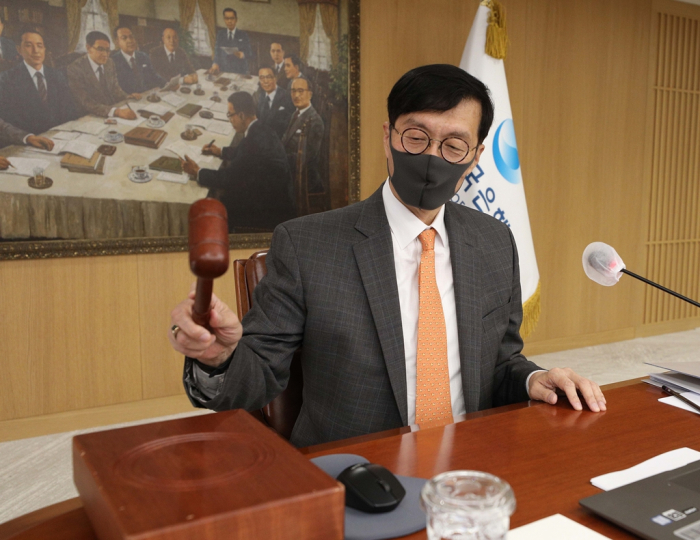BOK may increase rate by only 25 bps this week as won rebounds
Investors will watch if any BOK policy board members will insist on continued aggressive interest rate hikes
By Nov 21, 2022 (Gmt+09:00)
LG Chem to sell water filter business to Glenwood PE for $692 million


Kyobo Life poised to buy Japan’s SBI Group-owned savings bank


KT&G eyes overseas M&A after rejecting activist fund's offer


StockX in merger talks with Naver’s online reseller Kream


Mirae Asset to be named Korea Post’s core real estate fund operator



South Korea’s central bank is likely to raise interest rates by only 25 basis points this week as its won currency may have bottomed out, easing concerns over accelerating inflation as Asia’s fourth-largest economy slows amid a potential credit crunch.
The won earlier this month reported its largest daily gain in almost 14 years as lower-than-expected US inflation data bolstered expectations that the Federal Reserve may slow its rate hike moves. That reduced inflationary pressure from higher import prices and possibilities of capital outflows, analysts said.
“The won, the weakness of which had been a key factor for the BOK’s aggressive rate hike, has recently rebounded sharply,” said Kang Seung-won, an economist at NH Investment & Securities, referring to the Bank of Korea. “US consumer inflation has cooled, so the BOK will raise the rate by only 25 bps this time.”
The BOK had indicated it is more likely to increase the base interest rate by 50 bps again at its last policy meeting for this year on Thursday as the US Federal Reserve delivered a fourth straight 75-bp hike earlier this month to raise its federal funds rate to 3.75-4.00%, the highest level since January 2008.
Last month, the BOK took its second big step of a 50-bp rate hike, raising the policy interest rate to 3.00%. The won, one of the worst-performing emerging Asian currencies this year, has gained some 7% since the increase.
HURT GROWTH
Such tightening, however, bit into economic growth, especially when the local financial market has been facing the growing risks of a credit crunch due to the fallout of a debt default by the domestic developer of a Legoland theme park.
“The credit market has been further strained and the property market has been sluggish, given the monetary policy tightening,” said Yoon Yeo-sam, an analyst at Meritz Securities. “On the other hand, pressure on monetary policy from a weaker won significantly eased, so it is less likely to take another big step to stabilize the foreign exchange market.”
Investors will watch to see if any members of the BOK’s monetary policy board insist on maintaining aggressive interest rate hikes, analysts said, especially given views in the US that the Fed may ease its policy tightening due to slower inflation.
Last month, two out of the seven BOK policy board members said the monetary authority needed to raise the rate by only 25 bps, saying an excessive rate hike could serve as further downward pressure on growth.
Write to Mi-Hyun Jo at mwise@hankyung.com
Jongwoo Cheon edited this article.
-
 Corporate bondsKorean firms at risk of credit rating downgrade on Legoland woes
Corporate bondsKorean firms at risk of credit rating downgrade on Legoland woesNov 13, 2022 (Gmt+09:00)
2 Min read -
 Foreign exchangeKorea won sees best day in nearly 14 yrs, may be climbing from bottom
Foreign exchangeKorea won sees best day in nearly 14 yrs, may be climbing from bottomNov 11, 2022 (Gmt+09:00)
2 Min read -
 Central bankBOK may raise rates by 50 bps again on Fed, inflation
Central bankBOK may raise rates by 50 bps again on Fed, inflationNov 03, 2022 (Gmt+09:00)
2 Min read -
 Corporate bondsBOK to ease Legoland developer default-led credit crunch
Corporate bondsBOK to ease Legoland developer default-led credit crunchOct 28, 2022 (Gmt+09:00)
2 Min read -
 Corporate bondsKorea's $35 bn plan yet to ease Legoland default woes
Corporate bondsKorea's $35 bn plan yet to ease Legoland default woesOct 25, 2022 (Gmt+09:00)
4 Min read -
 Central bankBOK takes another big step hike as weak won lifts prices
Central bankBOK takes another big step hike as weak won lifts pricesOct 12, 2022 (Gmt+09:00)
3 Min read


